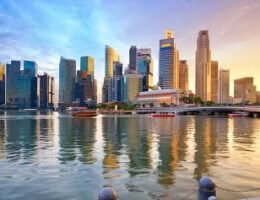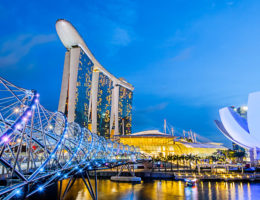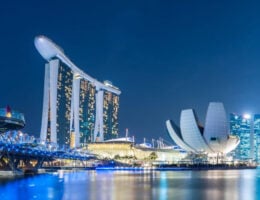The Infocomm Media Development Authority of Singapore (IMDA) is launching two initiatives, the generative AI (GenAI) Playbook and the GenAI Navigator, to make artificial intelligence (AI) more accessible to Singapore businesses and to increase its adoption locally.
The Infocomm Media Development Authority (IMDA) has released a new set of advisory guidelines (Advisory Guidelines) aimed at enhancing the resilience and security of cloud services and data centers in Singapore. These Advisory Guidelines are part of Singapore’s broader digital infrastructure strategy and reflect growing emphasis on the systemic importance of digital services and infrastructure to both the economy and daily life.
On 10 March 2025, the Health Sciences Authority launched its public consultation for the draft on the Best Practices Guide for Medical Device Cybersecurity. The document provides medical device manufacturers and healthcare providers with best practice recommendations and considerations on general cybersecurity principles to protect the security of medical devices for their entire product life cycle.
On 7 March 2025, the Ministry of Health announced a host of changes to the healthcare system to address the shifting needs of the Singapore population. These changes included a review of advertising regulations for certain healthcare professionals, the recognition of family medicine as a medical specialty and the introduction of registration requirements for psychologists.
On 11 February 2025, the Singapore government announced new AI safety initiatives, namely: (i) the Global AI Assurance Pilot for best practices around technical testing of generative AI applications; (ii) the Joint Testing Report with Japan; and (iii) the publication of the Singapore AI Safety Red Teaming Challenge Evaluation Report. These initiatives aim to enhance AI governance, innovation and safety standards.
In December 2024, privacy concerns were raised after the new Bizfile portal of the Accounting, Corporate and Regulatory Authority of Singapore displayed names and full National Registration Identity Card numbers for free in its search results.
The Personal Data Protection Commission has since clarified the appropriate use and misuse of NRIC numbers.
On 28 November 2024, the Australian Government passed a law banning social media for children under the age of 16. The Australian Government’s recent move has raised questions in Singapore on the assessment and effectiveness of such bans, and whether there is a possibility of introducing a similar ban in Singapore.
These questions were addressed by the Ministry for Digital Development and Information during the parliament sitting on 7 January 2025.
In brief
The Ministry of Home Affairs (MHA) introduced the Maintenance of Racial Harmony Bill (“Bill”) and the Constitution of the Republic of Singapore (Amendment) Bill in Parliament for First Reading on 7 January 2025.
The Bill introduces specific legislation on racial harmony and consolidates the government’s existing powers to deal with racial issues and threats to racial harmony, including a Restraining Order (RO) regime to deal with content prejudicial to racial harmony.
In more detail
Background
The Bill takes close reference from the existing Maintenance of Religious Harmony Act (MRHA) and the Penal Code.
The key proposals in the Bill are closely aligned with those in the MRHA and include the introduction of the following: (1) an RO regime to target content prejudicial to racial harmony in Singapore; (2) a community-based approach to managing racial incidents; and (3) safeguards to prevent designated race-based entities from being used as vectors of foreign influence.
The Bill also consolidates Penal Code offences relating to race (e.g. inciting feelings of enmity, hatred, ill-will or hostility against a racial group; inciting violence on the basis of race, or against a racial group). The Bill will also contain provisions that apply even if the offending conduct occurs or threats originate from overseas (e.g. via social media), as long as the offence was directed towards a person or group in Singapore.
Restriction orders
Similar to the existing RO scheme under the MRHA, the proposed Bill enables the Minister of Home Affairs to issue ROs against persons involved in the communication, production or distribution of content that prejudices the maintenance of religious harmony in Singapore.
A racial content RO under the Bill may do the following:
Prohibit a person from communicating or distributing specified information or material;
Prohibit a person from addressing a specified audience on a specified subject;
Require a person to take all reasonably practicable steps to ensure that any specified information or material is no longer available to the general public in Singapore;
Prohibit a person from printing, editing, assisting, or contributing to a specified publication; and
Prohibit a person from holding office in an editorial board or a committee of a specified publication.
The RO takes immediate effect once issued. There will be safeguards in place for the issuance of ROs — all ROs will be reviewed by the new Presidential Council for Racial and Religious Harmony (PCRRH) (replacing the Presidential Council for Religious Harmony established under the MRHA) and are subject to confirmation by the President. Persons issued an RO will also be able to make representations to the PCRRH.
Safeguards against foreign influence
The Bill also introduces safeguards against external actors exerting malicious foreign influence to undermine racial harmony.
The safeguards will apply to designated race-based entities. An entity may be designated if the Competent Authority is satisfied that:
Its primary or other objects, purposes or activities includes representing or promoting the interests of, or discussing any issue relating to, any race; and
Designation is deemed necessary or expedient to pre-empt, prevent or reduce any foreign influence that may undermine racial harmony in Singapore.
Examples of designated entities include clan and business associations linked to the Chinese, Malay and Indian races.
These entities will be notified of the Competent Authority’s intent to designate them, and can submit representations as to why they need not be designated before a final decision is reached. Designated race-based entities may also apply to the Minister for Home Affairs for exemptions from some or all obligations under the Bill.
Designated race-based entities will be subject to reporting and governance obligations, including the following:
Requirements to disclose: (i) foreign and anonymous donations accepted; (ii) foreign affiliations; and (iii) their leadership composition
Requirements to comply with leadership restrictions, to ensure that: (i) more than half of the entity’s governing body comprises of Singapore citizens; and (ii) the responsible officers of the entity are Singapore citizens or permanent residents
The Minister for Home Affairs will also have powers to impose stepped-up measures against specific race-based entities through the issuance of foreign influence ROs. Such ROs can:
Prohibit an entity from accepting donations from a specified foreign principal, or any anonymous donation;
Require an entity to return or dispose of any donation from a specified foreign principal, or any anonymous donation;
Prohibit an entity from forming or maintaining an affiliation with a foreign principal; and/or
Prohibit an entity from appointing or retaining any individual as a member of its governing body.
Key takeaways
The Bill is part of the MHA’s and the government’s broader efforts to strengthen racial cohesion and promote racial harmony in Singapore.
Further information is available on the MHA’s website.
For further information and to discuss what this development might mean for you, please get in touch with your usual Baker McKenzie contact.
* * * * *
LOGO_Wong&Leow_Singapore
© 2025 Baker & McKenzie. Wong & Leow. All rights reserved. Baker & McKenzie. Wong & Leow is incorporated with limited liability and is a member firm of Baker & McKenzie International, a global law firm with member law firms around the world. In accordance with the common terminology used in professional service organizations, reference to a “principal” means a person who is a partner, or equivalent, in such a law firm. Similarly, reference to an “office” means an office of any such law firm. This may qualify as “Attorney Advertising” requiring notice in some jurisdictions. Prior results do not guarantee a similar outcome.
ASEAN Digital Ministers’ Meeting on 16-17 January 2025.
The Guide supplements the ASEAN Guide on AI Governance and Ethics (2024), which focuses on traditional AI technologies and includes policy considerations relevant to generative AI.
The Infocomm Media Development Authority has launched a Code of Practice for Online Safety for App Distribution Services (ADSs) (“Code”), which requires designated ADSs to implement system-level measures to reduce the risk of exposure to harmful content for users, particularly for children.
The Code will take effect starting 31 March 2025.








